In today’s fast-paced business world, having the right tools to manage customer relationships is essential for success. Customer Relationship Management CRM software is a valuable tool that can help businesses improve their efficiency, increase sales, and build stronger relationships with their customers. In this article, we will be discussing the top 10 CRM software options that can help boost your business in 2024.
In this article
1. What is the main purpose of using CRM software?
The main purpose of using CRM management software is to improve customer relationships and streamline business processes. CRM software helps businesses keep track of customer interactions, manage sales leads, and analyze customer data to improve marketing campaigns and sales strategies. By using CRM software, businesses can provide better customer service, increase sales, and build stronger relationships with their customers.
2. 10 best CRM management software deserve a try
Here are the top 10 CRM customer relationship management software options that deserve a try in 2024:
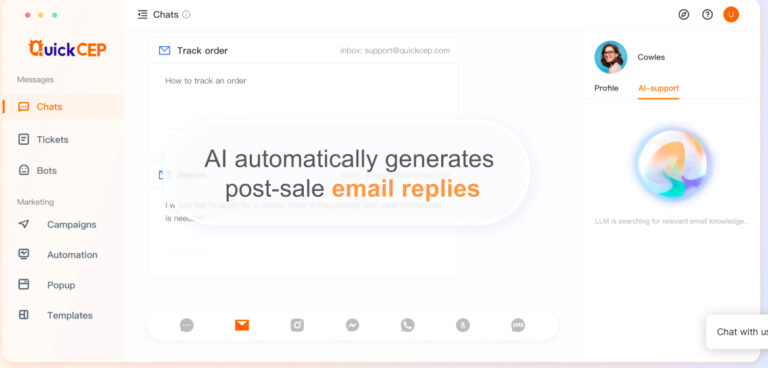
Features:
Quickcep excels in advanced contact management by allowing businesses to maintain detailed customer profiles and interaction histories. Its sales automation features streamline processes such as lead scoring and email campaigns, freeing up valuable time for sales teams. The platform also provides comprehensive analytics, offering insights into customer behavior and marketing effectiveness.
Pros:
The user-friendly interface of Quickcep makes it accessible even for teams less familiar with CRM systems, reducing the learning curve. Its customizable features ensure the platform can adapt to the unique needs of different businesses. Excellent customer support ensures that any issues are resolved swiftly, providing confidence to users.
Cons:
A notable limitation is its restricted integration options, which may not meet the needs of businesses requiring extensive third-party software sync. Companies with complex tech ecosystems may find these integrations inadequate.
2. Zendesk
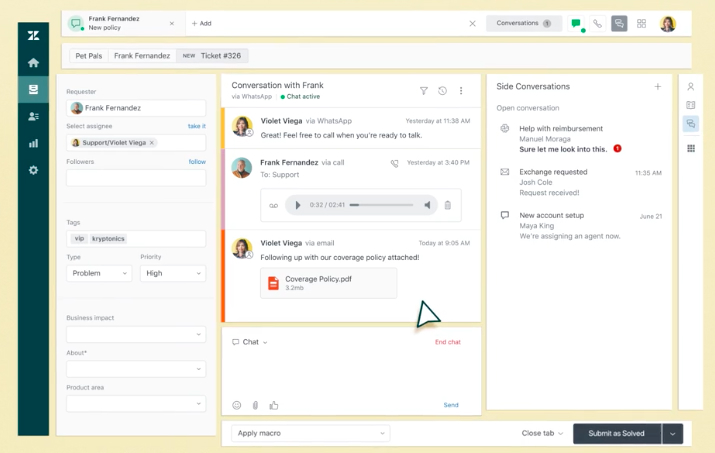
Features:
Zendesk is renowned for its customer support features, including ticketing systems and live chat, ensuring quick resolution of customer issues. The software includes sales automation tools that manage pipelines and forecast sales, improving efficiency. Additionally, Zendesk offers marketing tools that enable businesses to segment and target their audience effectively.
Pros:
Its ease of use makes Zendesk accessible for teams with varying technical skills, encouraging widespread adoption. The platform is highly customizable, allowing businesses to tailor it to their specific needs. Zendesk’s excellent customer support ensures prompt assistance, enhancing user experience.
Cons:
The pricing structure can be prohibitive for small businesses or startups, particularly when advanced features are needed. This could lead to increased operational expenses.
3. Zoho
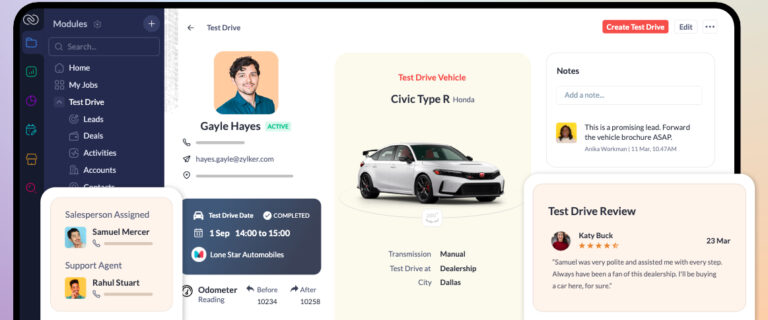
Features:
Zoho offers a robust CRM solution that includes marketing automation for executing targeted campaigns and managing customer interactions. It provides inventory management capabilities, integrating sales and stock control for a comprehensive overview. Additionally, Zoho offers extensive API and integration features, allowing for seamless connections with other business tools.
Pros:
Zoho’s pricing is competitive and offers significant value for small to mid-sized businesses looking for a comprehensive CRM solution. The extensive integration options facilitate the easy connection of existing business tools, enhancing operational efficiency. Its user-friendly interface promotes rapid adoption across teams.
Cons:
Despite its robust offerings, customization options within Zoho are more limited compared to some competitors, which could restrain companies needing highly tailored solutions.
4. HubSpot
Features:
HubSpot provides a free CRM option that includes essential tools for managing customer relationships. Its marketing automation features enable businesses to create and manage campaigns efficiently. The platform supports extensive integrations, connecting with numerous third-party applications to enhance CRM functionality.
Pros:
The availability of a free CRM option makes HubSpot particularly attractive to small businesses or startups. The ease of use ensures that teams with varying levels of CRM experience can utilize the system effectively. Its wide range of integrations enhances the CRM’s flexibility and utility.
Cons:
One limitation is the platform’s somewhat restricted reporting capabilities, which might not suffice for businesses with comprehensive analytical needs.
5. Salesforce
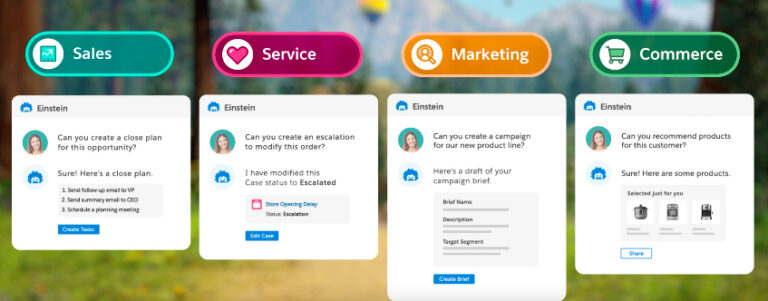
Features:
Salesforce is equipped with extensive CRM functionalities that include robust marketing automation and customer support tools. The platform is highly customizable, allowing businesses to tailor their CRM environment extensively. It also offers powerful reporting tools, providing detailed insights into sales, marketing, and customer service operations.
Pros:
Salesforce’s extensive customization options allow businesses to create bespoke solutions that fit specific operational needs. Its robust reporting capabilities enable detailed data analysis, supporting informed decision-making. Excellent customer support adds to its appeal, ensuring users can maximize the CRM’s potential.
Cons:
The platform’s high pricing and steep learning curve can be a barrier for small businesses or inexperienced users, potentially impacting cost-efficiency and user adoption.
6. Insightly
Features:
Insightly combines core CRM functions with project management capabilities, enabling businesses to align sales and project workflows. It offers marketing automation tools that facilitate lead nurturing and customer relationship growth. The platform provides a user-friendly interface, enhancing usability for teams.
Pros:
Insightly’s affordable pricing makes it accessible for small businesses looking to integrate CRM and project management. Its user-friendly interface boosts adoption rates, minimizing the learning period for new users. Excellent customer support ensures prompt resolution of queries and issues.
Cons:
The platform offers limited customization options, which might not meet the needs of companies requiring intricate CRM setups.
7. Freshsales
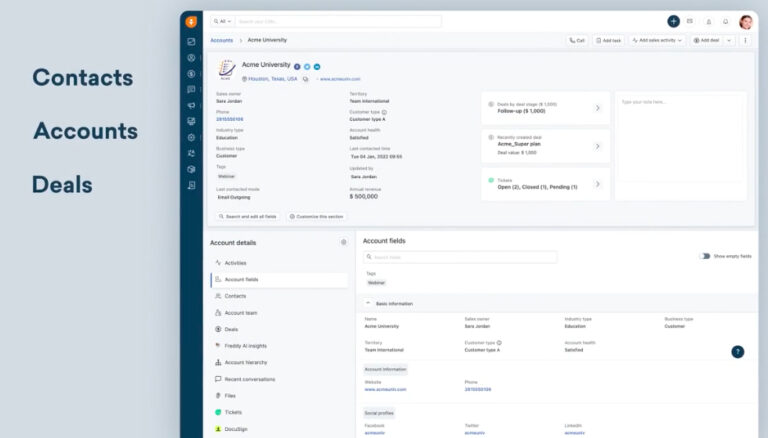
Features:
Freshsales offers CRM solutions focused on sales automation, providing tools for managing leads, contacts, and deals efficiently. Its reporting capabilities provide insights into sales pipeline performance and team productivity. The platform features an AI-based lead scoring system, enhancing sales prioritization.
Pros:
Competitive pricing makes Freshsales an attractive option for businesses on a budget. Its intuitive interface ensures ease of use, promoting widespread adoption. The robust reporting tools aid in performance tracking and strategic planning.
Cons:
Limited customization options may restrict adaptability for businesses with specific or complex needs.
8. Pipedrive

Features:
Pipedrive focuses on CRM and sales process management, with an intuitive pipeline view for tracking deal progress. The platform automates repetitive tasks, freeing up time for sales teams to focus on high-priority activities. It offers customizable fields and templates to align with specific business needs.
Pros:
Pipedrive’s simplicity and ease of use are significant strengths, allowing users to master it quickly. Its customization capabilities ensure alignment with unique business processes. Customer support is a highlight, providing reliable assistance.
Cons:
The system’s limited integrations can be a barrier for businesses relying on a diverse set of digital tools.
9. ClickUp

Features:
Predominantly a project management tool, ClickUp includes CRM capabilities, offering task and project tracking to align team efforts. The platform allows for extensive integrations with other business tools, enhancing its versatility. Its collaborative features boost team communication and coordination.
Pros:
An all-in-one platform offers robust integration options, facilitating seamless workflow management. Ease of use ensures easy onboarding and user adoption. The collaborative features enhance productivity and team synergy.
Cons:
The CRM features are basic compared to dedicated CRM systems, which may limit its applicability for businesses seeking comprehensive CRM solutions.
10. Monday

Features:
Monday offers a flexible CRM solution incorporating project management and team collaboration tools. It allows for extensive customization of workflows and dashboards, adapting to diverse business processes. The platform supports various integrations, enhancing its functionality.
Pros:
Monday’s flexible pricing and customizable workflows appeal to businesses of varying sizes. The user-friendly platform encourages quick adoption and efficient usage. The comprehensive integration capabilities enhance operational flexibility.
Cons:
Its limited reporting capabilities may not suffice for businesses needing detailed analytical insights.
3. How to select the best CRM software for small business
When selecting the best CRM software for your small business, consider the following factors:
Ease of use: Choose a CRM software that is easy to use and understand.
Features: Look for CRM software that offers the features and tools your business needs to succeed.
Pricing: Consider your budget and choose a CRM software that offers affordable pricing options.
Customer support: Select a CRM software provider that offers excellent customer support to help you with any issues that may arise.
User reviews: Read user reviews and testimonials to get an idea of the CRM software’s effectiveness and reliability.
Conclusion
CRM software is a powerful tool that can help businesses improve their efficiency, increase sales, and build stronger relationships with their customers. By choosing the best CRM management software for your business, you can streamline processes, track customer interactions, and identify sales opportunities to boost your business in 2024. Consider trying out Quickcep, a top-ranked CRM management software that offers advanced features, excellent customer support, and affordable pricing. By investing in the right CRM software, you can take your business to the next level and achieve greater success in the year ahead.



